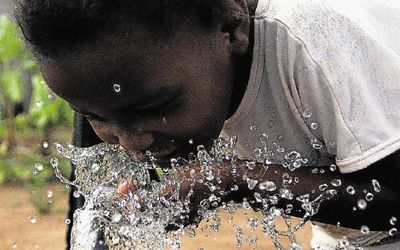Expect surge in waterborne diseases‚ says Sama
by Wire Staff,
2015-11-23 16:30:54.0
AS IF the drought has not caused enough damage to the economy and food production‚ the South African Medical Association (Sama) has warned that climate change will produce a surge in waterborne diseases.
Sama issued a statement on Monday saying that the direct and indirect effects of climate change would include "malaria‚ dysentery‚ cholera and dengue‚ compromised drinking water‚ a loss in production and food security and an increase in extreme weather events".
Sama has set up a task team to deal with the effects of climate change.
Sama chairman Dr Mzukisi Grootboom said extreme weather would result in floods‚ droughts and heat waves.
He said the association would continue to work with the health and environmental departments to address the continuing crisis.
"Human health is a priority sector in responding to climate change and we commend the government for identifying it as such‚" he said.
Sama said the World Health Organisation (WHO) was drawing attention to the "catastrophic impact" of climactic shifts on human health‚ and on the role healthcare professionals could play.
"The WHO puts a high number of deaths and disease globally down to avoidable environmental risks, including urban outdoor pollution; indoor smoke from the burning of solid fuels and biomass in poor countries; unsafe water‚ sanitation and hygiene; chemical exposure; and occupational diseases."
Dr Grootboom said the greatest burden "falls crushingly on the health systems of developing countries — mostly in sub-Saharan Africa — and poorer segments of the society".
"The time of only speaking the right words is over and action is needed. Sadly‚ global warming and climate change are anthropogenic — human activity is primarily responsible for them‚" he said.
The Council for Scientific and Industrial Research and other international experts forecast that 2015 is going to prove the warmest year on record and said there was a growing consensus among scientists that a greater than 2°C increase in global temperatures above preindustrial levels would have dangerous global consequences.
"The earth is warming faster than at any other time in history and the impact is now being felt by every single one of us‚" Dr Grootboom said.
TMG Digital

Qando Mkhize of Ntingewe in KwaZulu-Natal drinks clean water from a tap for the first time in her life after the area was affected by cholera. Unhygienic conditions fuel major disease outbreaks such as cholera in developing countries. File picture: MASTER MOSUNKUTU
AS IF the drought has not caused enough damage to the economy and food production‚ the South African Medical Association (Sama) has warned that climate change will produce a surge in waterborne diseases.
Sama issued a statement on Monday saying that the direct and indirect effects of climate change would include "malaria‚ dysentery‚ cholera and dengue‚ compromised drinking water‚ a loss in production and food security and an increase in extreme weather events".
Sama has set up a task team to deal with the effects of climate change.
Sama chairman Dr Mzukisi Grootboom said extreme weather would result in floods‚ droughts and heat waves.
He said the association would continue to work with the health and environmental departments to address the continuing crisis.
"Human health is a priority sector in responding to climate change and we commend the government for identifying it as such‚" he said.
Sama said the World Health Organisation (WHO) was drawing attention to the "catastrophic impact" of climactic shifts on human health‚ and on the role healthcare professionals could play.
"The WHO puts a high number of deaths and disease globally down to avoidable environmental risks, including urban outdoor pollution; indoor smoke from the burning of solid fuels and biomass in poor countries; unsafe water‚ sanitation and hygiene; chemical exposure; and occupational diseases."
Dr Grootboom said the greatest burden "falls crushingly on the health systems of developing countries — mostly in sub-Saharan Africa — and poorer segments of the society".
"The time of only speaking the right words is over and action is needed. Sadly‚ global warming and climate change are anthropogenic — human activity is primarily responsible for them‚" he said.
The Council for Scientific and Industrial Research and other international experts forecast that 2015 is going to prove the warmest year on record and said there was a growing consensus among scientists that a greater than 2°C increase in global temperatures above preindustrial levels would have dangerous global consequences.
"The earth is warming faster than at any other time in history and the impact is now being felt by every single one of us‚" Dr Grootboom said.
TMG Digital




















Change: 1.19%
Change: 1.36%
Change: 2.19%
Change: 1.49%
Change: -0.77%
Data supplied by Profile Data
Change: -0.08%
Change: 0.12%
Change: 1.19%
Change: 0.00%
Change: 0.10%
Data supplied by Profile Data
Change: 0.32%
Change: 0.36%
Change: 0.33%
Change: 0.22%
Change: 0.23%
Data supplied by Profile Data
Change: -0.04%
Change: -0.51%
Change: -0.25%
Change: -0.17%
Change: -0.02%
Data supplied by Profile Data